
“I think the training went great. You provided a lot of good information that we need.”
Fully accredited. Globally recognized. Built for the next generation of Addiction & Mental Health Professionals.




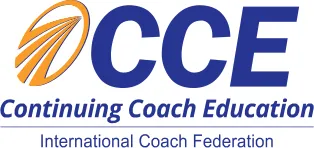




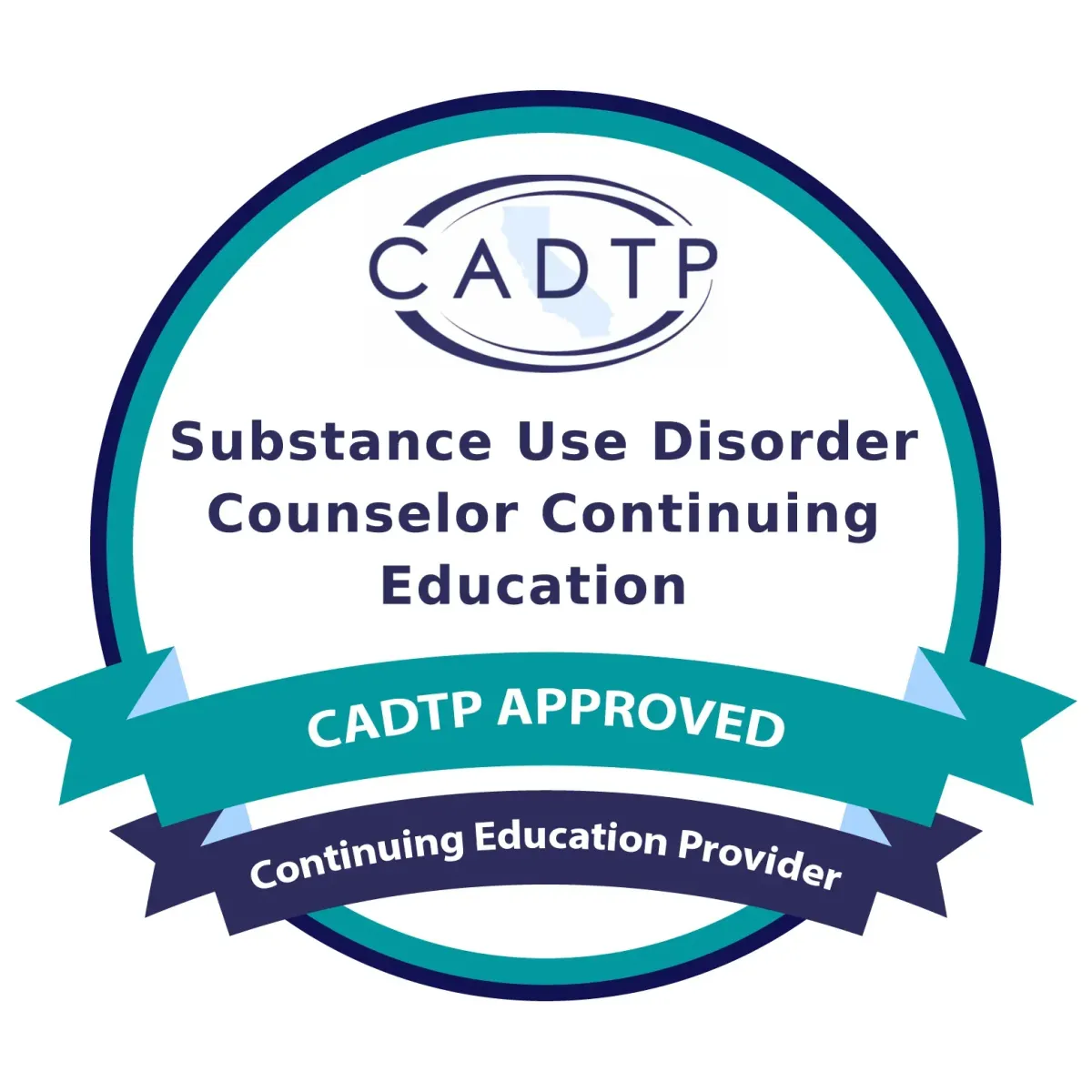


The Certified Trauma Coach program is a fully accredited professional certification that equips individuals to work in the fast-growing field of trauma-informed coaching. Built for mental health professionals, life coaches, wellness practitioners, and those in the healing arts, the program provides the credibility, structure, and support needed to serve clients affected by trauma while maintaining clear boundaries from therapy.
Trauma shows up in more ways than most people realize: fatigue, anxiety, panic attacks, somatoform disorders, addiction, avoidance, and more. Clients often try to mask or cope with trauma instead of healing it. As a Trauma Coach, your role is to help them get to the root cause, apply real solutions, and finally move toward a full, productive, and joyful life.
You’ll learn what trauma really is, how to identify it (including DSM-based categories), and how to coach someone through recovery without re-traumatization. You’ll also gain clarity on the lines between coaching and therapy, build relationships with clinical professionals, and understand when to refer for complex cases such as C-PTSD, sexual trauma, or human trafficking survivors.


Understand how trauma impacts the brain, body, and emotions
Recognize symptoms from anxiety to somatic disorders
Learn the difference between “big T” and “small t” trauma

Stay within the scope of trauma coaching
Know when and how to refer to clinical professionals
Build collaborative relationships with therapists and treatment teams

Explore how unresolved trauma fuels substance use and coping behaviors
Recognize patterns like relapse, avoidance, and self-medication
Coach clients through safer, healthier recovery strategies

Identify trauma bonding, gaslighting, and narcissistic abuse
Address childhood trauma and ACE scores
Understand cultural and generational trauma perspectives

Use screening and assessment frameworks to uncover hidden trauma
Apply resilience and mindfulness practices with clients
Integrate somatic techniques to address body-based trauma responses

Add trauma-informed coaching into your practice or wellness business
Navigate ethics and client safety with confidence
Position yourself as a certified professional in a growing field


Explain how trauma affects the brain, body, and emotions
Connect patterns of addiction to unresolved trauma
Teach mindfulness and resilience techniques for regulation
Distinguish between trauma coaching and trauma therapy
Recognize trauma bonding, narcissistic abuse, and manipulation patterns
Integrate trauma coaching into an existing practice or business



20 CEUs / CME / CE / Hrs
Each course is designed to meet the global standards, with clear objectives, real-world application, and evidence-based frameworks. You’ll study:

What trauma is, how it shows up in thoughts, feelings, and the body, and where a coach’s role starts and stops. You’ll learn to validate, support, and refer without re-traumatizing—using a practical, street-smart approach grounded in science.

The psychological symptoms, cultural repression, and systemic neglect that keep trauma hidden. From SAMHSA statistics to childhood imprinting, mass trauma, disassociation, and even the control dynamics of sex work, this session reveals just how complex trauma is

Why trauma scrambles cognition and decision-making—and how “high-functioning” chaos is often unhealed hurt in disguise. You’ll coach clients to replace shame loops with calm, agency, and simple, repeatable wins.

How chronic trauma rewires the brain and relationships, plus real-world patterns of BPD, trauma bonds, and attention/validation cycles. You’ll learn when to coach behaviors, when to pause, and when to refer out.

Modern manipulation decoded: love bombing, gaslighting, breadcrumbing, coercive control. You’ll use clear frameworks (e.g., Power/Control Wheel, NLP tools, session structure) to help clients reclaim identity and choice.

Resilience isn’t “survive more pain”—it’s choose different. You’ll redirect victim identity into ownership, map repeating patterns, and turn lived experience into purpose-driven action.

CBT’s cognitive triangle, urge surfing, mindset tracking, and practical mindfulness. You’ll validate feelings, reframe thoughts, and install simple rituals that shift behavior fast.

Trauma lives in the body. You’ll integrate movement, somatic/NLP techniques, red-flag awareness, and clear referral lines to guide clients from dysregulation to stability—safely and ethically.

6 CEUs / CME / CE / Hrs
Gain a deep understanding of ethical responsibilities, including confidentiality, professional standards, report writing, case management, and legal compliance across state lines. Through practical scenarios, action planning, and guidance on boundaries, trust-building, and communication, participants learn to navigate complex ethical situations confidently.

Like any respected accredited program, your training concludes with a comprehensive final examination designed to validate your mastery of the material. Passing this exam isn’t just a formality — it’s the moment you prove, both to yourself and to the field, that you are prepared to practice at the highest standard. Unlike most institutions, we don’t tack on hidden fees. Your exam, grading, and official certification are fully included in your tuition.

Gain exclusive marketing seals and the right to use the NCTC designation, showcasing your expertise and credibility as a Certified Trauma Coach. Enhance your professional profile, attract clients, and stand out in the coaching field.

Join 10 weeks of live group mentorship with a master coach to get personalized guidance, real-time feedback, and proven strategies for coaching. Collaborate with peers, ask questions, and apply new skills in a supportive, hands-on environment designed to accelerate your growth and confidence.

Enjoy 6 months of on-demand access to the full training, allowing you to learn at your own pace. Revisit lessons anytime, review key strategies, and reinforce your coaching skills whenever it fits your schedule.

Ready-to-use exercises and proven tools that make working with clients—or supporting loved ones in recovery—simpler, more structured, and more effective. It takes the guesswork out of what to do next and helps create real change instead of spinning in circles.

Be found by clients actively searching for addiction and mental health professionals.

Tap into a global network of certified professionals, mentors, and peers.

Keep leveling up your credentials and skills—while paying a fraction of the cost.

Nationally Certified
Trauma Coach
26 Combined CEUs
WEEKLY LIVE CALLS
Expert Led
10 Weeks Of Mentorship
Move At Your Own Speed
Self Paced
With 6mo To Complete
BACK TO SCHOOL SPECIAL
$999
Regular Pricing $1997
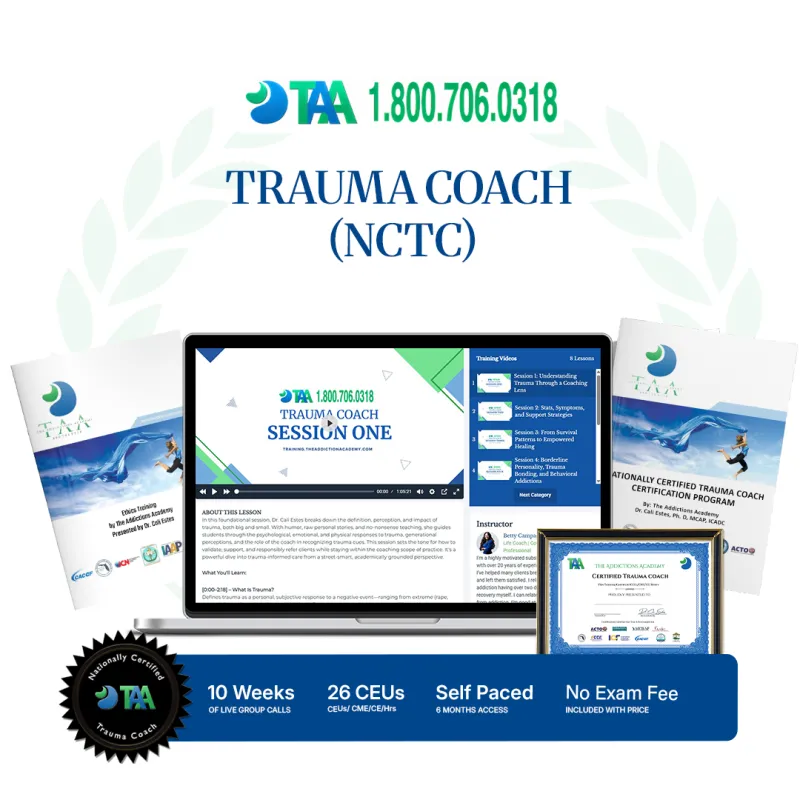

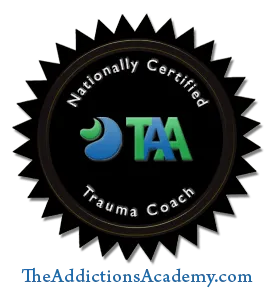
Trauma Coach Certification Program
$999.00
Quantity

I'm a highly motivated substance abuse professional with 19 years of experience in the addiction field. I've helped many clients break the cycle of addiction and left them satisfied. I'm good at connecting with people and healing those struggling with substance abuse and life issues; I help addicts get and stay clean. Capable of understanding the complexities of drug and alcohol addiction by maintaining strict confidentiality and realizing that overcoming addiction requires a holistic, comprehensive, and caring approach to promoting a healthier lifestyle.
I help clients set attainable life, career, and relationship goals and teach them healthy problem-solving by identifying causes and setting limits to prevent former addicts from relapsing. Helping clients overcome addictions requires knowledge and skills. I use cutting-edge, tried-and-true methods to help my clients beat addictions. Skilled at using coaching techniques to save more lives, heal relationships and physical health, and let people return to or stay on the job.

A trauma coach is a certified professional who helps clients recognize, understand, and work through the effects of trauma—without stepping into the role of a therapist. Unlike therapy, which diagnoses and treats mental health disorders, trauma coaching focuses on support, coping strategies, and forward movement. In short, a trauma coach isn’t there to diagnose or treat clinical trauma disorders. They’re there to bridge the gap: providing guidance, accountability, and practical tools that empower clients to heal, grow, and build a more stable, fulfilling life.
Yes — this certification is designed to complement clinical work. If you already work in a treatment center or clinical setting, becoming a Nationally Certified Trauma Coach gives you an additional, trauma-informed coaching toolkit that helps you better support clients outside the strict boundaries of therapy.
Someone might choose a trauma coach instead of a therapist or sponsor because coaching fills a unique space between the two.
Unlike therapy, trauma coaching doesn’t require a diagnosis, insurance, or years in treatment. It’s more action-oriented, solution-focused, and forward-moving, giving clients tools they can apply right away.
Unlike sponsorship, coaching is professional, structured, and guided by accredited training. A trauma coach is equipped with assessments, trauma-informed frameworks, and ethical guidelines that sponsors simply don’t provide.
For many clients, a coach feels more accessible and collaborative—a supportive guide who validates their experience, keeps them accountable, and helps them move from surviving to thriving.
In short: therapy heals the past, sponsorship offers peer support, but trauma coaching bridges the gap—helping clients turn insight into action and build a healthier, more productive future.
No — you don’t need a degree or license to take the Certified Trauma Coach (NCTC) program. The training is designed to be accessible to professionals from a wide range of backgrounds, including coaches, wellness practitioners, treatment staff, and those entering the field for the first time. While an understanding of mental health or life coaching is helpful, it’s not required. Once certified, you’ll have the tools, accreditation, and supervision hours needed to begin practicing trauma-informed coaching right away, without the barrier of an advanced degree or clinical license.
As a Certified Trauma Coach, your earning potential depends on how you structure your practice, niche, and client base. Most trauma coaches charge $75–$250 per hour for one-on-one sessions, with many offering packages, group programs, or retreats that increase income. On average, coaches working part-time earn $25K–$50K per year, while full-time trauma coaches can generate $75K–$150K+ annually, especially when they add online programs, workshops, or speaking engagements. Because trauma is such a specialized and in-demand skill set, certification allows you to charge premium rates, position yourself as an expert, and build a sustainable business helping clients heal.
Most students complete the training and earn their certification in 8 to 10 weeks. You’ll have access to on-demand video modules, plus 10 weeks of live mentorship, so you can move at your own pace with expert guidance along the way.
Go beyond surface fixes. Learn to spot, map, and coach the real drivers of pain—safely, ethically, and with tools that create lasting change
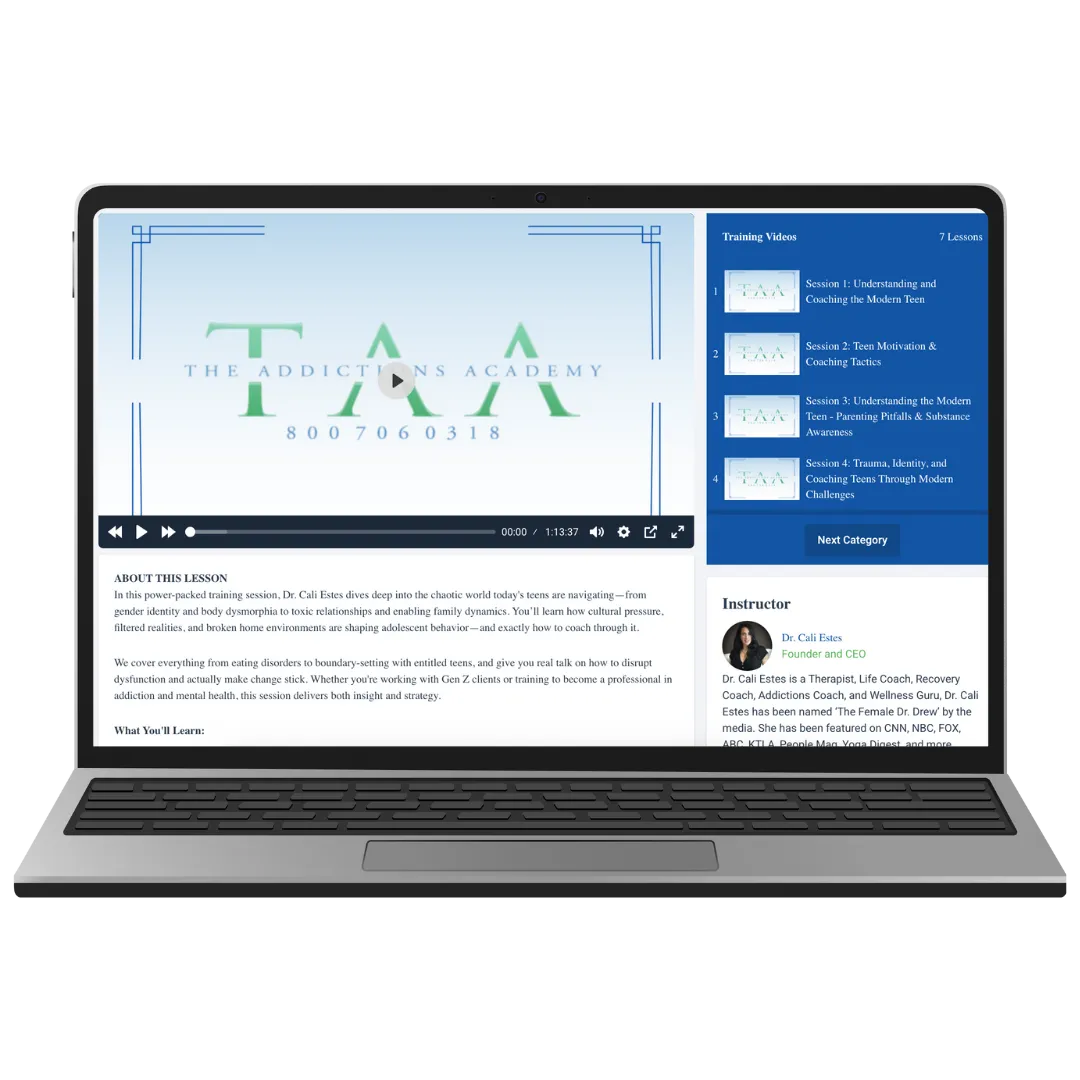
Go beyond surface fixes. Learn to spot, map, and coach the real drivers of pain—safely, ethically, and with tools that create lasting change.
No application or pre-requisites needed for our certifications. Start your journey with us today!
No application or pre-requisites needed for our certifications. Start your journey with us today!
$999
Next Live Group Coaching Call Starts Tuesday, September 30th. Self Study Videos Available Immediately Upon Registration
This Program Earns You A Nationally Recognized and Accredited Certification In Trauma Coaching
10 Weeks
OF LIVE GROUP CALLS
26 CEUs
CEUs/CME/CE/Hrs
Self Paced
6 MONTHS ACCESS
No Exam Fee
INCLUDED WITH PRICE

The World’s Premier Training Institute for Mental Health & Addiction Professional Development.
2046 Treasure Coast Pkwy Unit A, #207 Vero Beach FL 32960